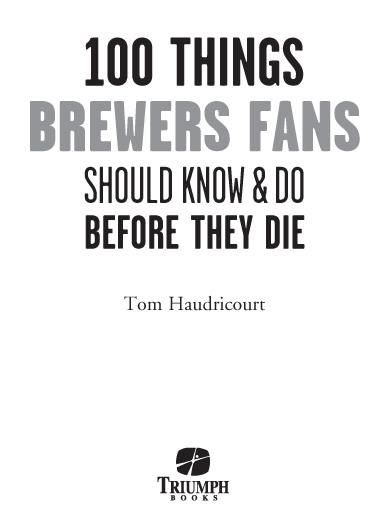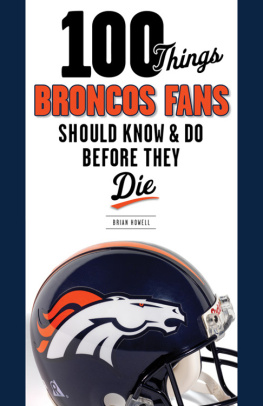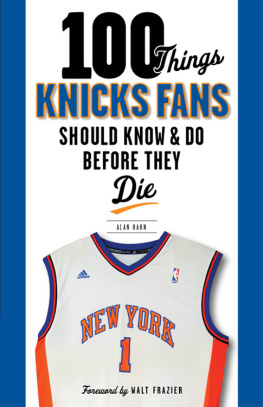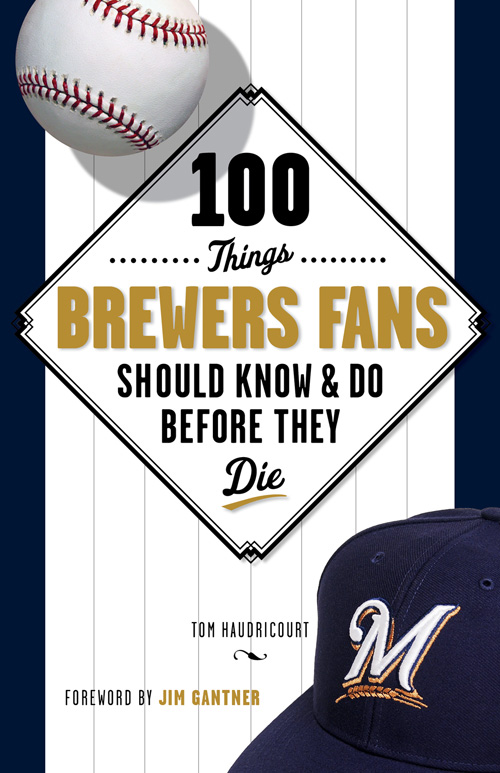
For my parents, George and Marian, who left us all too soon and far too close together in 2011. They would have been the first to read this book.
And for my wife, Trish, who has made the best of building a life with a husband whose work schedule allows little flexibility. Believe me when I say that I value her love, understanding, and support.
Contents
Foreword by Jim Gantner
I grew up as a Braves fan, following Hank Aaron, Eddie Mathews, Johnny Logan, and those guys. I was really a National League fan back then. When the Brewers moved to Milwaukee in 1970, I was a junior in high school at Campbellsport High. I didnt really follow the Brewers at first because nobody knew much about them.
Then one day the Brewers sent a scout to watch me and work me out in Eden, Wisconsin. Thats when I really started thinking about them. I went to UW-Oshkosh for two years. Then the Brewers drafted me in the 12 th round of the 1974 draft. That was a big deal in Eden, getting drafted by the Brewers. All of my friends and family were excited about it because it was the states team. I got called up in 76 and again in 77 and finally came up for good in 1978. The Brewers were getting good, and everybody in the state was getting pumped up about them. When I made it to the big leagues, everybody back home was so proud. I didnt know I had so many friends.
When we started winning, it was awesome. You couldnt go anywhere without people coming up to you. Youd go through the parking lot at County Stadium, and fans would offer you a brat or a beer. That was a lot of fun. There was a lot of electricity at the ballpark. We had a great bunch of guys on those teams. The clubhouse was a lot of fun. We were a close group, and everybody messed with each other. That was special. You dont see that much today.
We had a lot of characters back then, but when it was time to play the game, everybody was serious. We knew how to have fun but also play hard. Getting to play with Robin Yount and Paulie Molitor for all those years was great. You dont see things like that anymore. I got to play 15 years with two Hall of Famers. You cant beat that.
The Brewers had some down years after that, so it was great to see them start winning again and end a 26-year playoff drought in 2008. I knew the fans would support a winning team. They always have in Milwaukee. This organization has been great to me. I still enjoy coming around and being part of it. I felt so great for the players, the organization, the city, and the state.
Its incredible to draw 3 million fans a year in this market. That shows how great our fans are. You knew if the team won, the fans would come out. This is an awesome baseball town. All they talk about is the Brewers, everywhere you go. Im glad Im still a part of it.
Jim Gantner
Introduction
When presented with the challenge of finding 100 things for Brewers fans to know and do before they die, my immediate reaction was: will I be able to come up with that many? The Brewers, after all, do not have 100 years, or even half that, of history to provide nuggets readers might enjoy.
But as I delved into the project, I eventually found myself deleting items in favor of others I enjoyed more and hoped readers would, as well. Attaching sidebars also became a natural process, because often a particular theme or story could not be told completely without an addendum.
Next came the task of arranging the segments in supposed order of importance. This is where it became tricky, because the Racing Sausages certainly are not more important in team history than, say, Robin Younts 3,000 th career hit. But in terms of what the team is best known for these days, those costumed, oversized wieners are more famous than many of the players, past and present.
Accordingly, I tried to mix some of the seminal moments in Brewers history with other things fans consider important, such as tailgating. What resulted was a combination of historical events and Brewers pop culture, which I hope readers find both diverse and entertaining.
I also quickly came to terms with the notion that funny and bizarre items would be and should be a part of the book. For one thing, I like funny and bizarre items. So beyond detailing the Suds Series in 1982 and the Brewers long-awaited return to the postseason 26 years later, homage is paid to the likes of Chris One and Done Saenz, Gus the Wonder Dog, garbage collector turned reliever Joe Winkelsas, the Chuckie Carr mutiny, the worst interview ever by Jeff Juden, those dreaded Sweep Suits of 2001, and the night a Brewers fan actually fought with an opposing player under the stands.
As I waded into the 100 things, what immediately struck me was how many of these events and items I covered as a Brewers beat writer, first for the Milwaukee Sentinel and later for the merged Milwaukee Journal Sentinel . I first began covering the team during the 1985 season and have continued to do so since, with the exception of a brief period in 200203 when I covered the New York Yankees for The Record of Bergen, New Jersey.
Invariably, when searching through the archives of the Sentinel and Journal Sentinel to recapture details of segments in the book, I would see my byline atop the stories. Many times, my immediate reaction would be: where did all the years go?
In essence, I have covered the Brewers for more than 60 percent of their existence. I missed the glory year of 1982 and had to wait a long time to see champagne sprayed in the Brewers clubhouse, but the things I witnessed were almost enough to fill this book (adding events prior to my arrival on the scene completed the task).
The opening of Miller Park and the teams revival in recent years proved without doubt that Milwaukee is a good, perhaps great, baseball town. The team now draws 3 million fans or thereabouts every year, an extraordinary level considering the market size. Put a good and/or interesting team on the field, and they will come.
It is with that knowledge and great hope that I present these 100 things that Brewers fans should know and do before they die, with wishes that you have plenty of time to absorb them all before that final inevitability.
1. Bud Wouldnt Take No for an Answer
Simply put, without Bud Selig, there would be no Milwaukee Brewers.
A Milwaukee native, Selig took it personally when the Braves moved to Atlanta after the 1965 season. Selig was a devout baseball fan growing up in the city, and no one was happier when the Braves relocated from Boston in 1953, and no one was more devastated when they left town in a huff.
Before the moving vans were packed, Selig formed Teams, Inc., later renamed Brewers, Inc., a group that unsuccessfully sued to keep the Braves in town. He was haunted by a conversation he had with an elderly female baseball fan at the Braves final game at County Stadium on September 22, 1965. Youre all weve got now, the woman told Selig. Dont let us down.
Selig knocked on every baseball door he could find, attended every Major League Baseball meetingin essence, making a supreme pest of himself. He was determined to get big league ball back to Milwaukee, begging the games leaders for an expansion team and coming oh-so-close to buying the Chicago White Sox. Looking back at that frustrating time, Selig calls it probably the toughest five years of my life. But it taught me to be tenacious and have patience.
That determination and unwillingness to take no for an answer was rewarded in 1970, when Seligs group was allowed to purchase the Seattle Pilots out of bankruptcy. The transaction was concluded just days before the start of the season, and hurried preparations were made to transform the club from the Pilots to the Brewers, a nod to the citys rich tradition of beer making.





